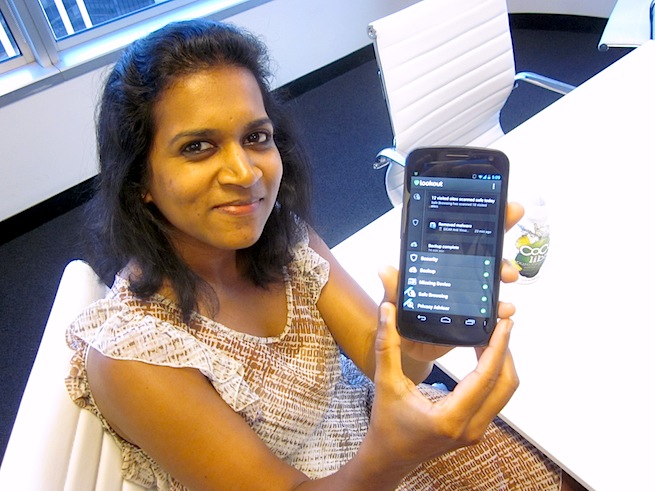Security company Lookout Mobile prides itself on protecting and finding your phone, and educating you in the process. The company redesigned its entire app, with a special feature that should help you find your phone even after the battery is dead.
[aditude-amp id="flyingcarpet" targeting='{"env":"staging","page_type":"article","post_id":547507,"post_type":"story","post_chan":"none","tags":null,"ai":false,"category":"none","all_categories":"business,mobile,security,","session":"C"}']Lookout’s latest feature, Signal Flare, gets us just a little bit closer to being able to find the phone even in its Sleeping Beauty state.
AI Weekly
The must-read newsletter for AI and Big Data industry written by Khari Johnson, Kyle Wiggers, and Seth Colaner.
Included with VentureBeat Insider and VentureBeat VIP memberships.
“Worldwide, 30 percent of people lose their phones and cannot recover them because their battery died,” said Lookout senior product manager Abheek Gupta in an interview with VentureBeat. “That’s a problem because it sounds like there’s not much you can do about it. Except that one of our engineers found a way to flag the location of the phone as the battery was on its last legs.”
It seems that right before a phone dies, it sends out a veritable S.O.S. In reality, the signal tells the tower that it’s dying, that this is the last signal it will put out, and records the location. It’s a definitive, “I am dead, this is where I rest,” and it’s up to you to go to that place and retrieve the phone (unless someone swiped it, or its in a moving vehicle).
Forget if my phone is stolen: This is useful if it dies somewhere in my couch cushions.
Kyle Barton (pictured right), one of Lookout’s engineers, found the signal and started playing around with it during one of the company’s downtime sessions. These times are reserved for employees to work on their own side-projects. (You’ve got to love when “Silicon Valley startup culture” actually produces something useful.)
The feature is opt-in only, as it does track your GPS. It will send you the “signal flares” in an email, so that it doesn’t bother you if your phone simply dies in your pocket.
[aditude-amp id="medium1" targeting='{"env":"staging","page_type":"article","post_id":547507,"post_type":"story","post_chan":"none","tags":null,"ai":false,"category":"none","all_categories":"business,mobile,security,","session":"C"}']
The redesign also comes built in a with a new feature that protects phones against a new “attack” called “click to call.” Here, attackers could enter “MMI codes,” or man-machine-interface codes, into a URL. When entered on the phone, these codes can do things like reset the phone back to factory settings and other, non-malicious annoyances. The aftermath of one of these attacks isn’t completely devastating (you know, unless they reset your camera and you lose all your pictures), but it has the potential to be, which is why the Lookout app is already wired to warn you if a clicked URL is harmful.
“We take security pretty seriously internally as well as externally, so … we’re wearing hidden tin-foil hats,” said Anbu Anbalagapandian (pictured above), the engineering lead for Lookout Mobile.
Luckily, not all phones are affected by MMI codes. You can check to see if yours is here.
The app is otherwise very sleek. It has grown up and taken advantage of Ice Cream Sandwich and Jelly Bean for Android devices (an the iOS version is definitely in the works). Lookout also released a new mobile web app to keep people safe while they’re browsing. The company warns four out of 10 people run into a malicious link on the open mobile web. The app will identify those links in a pop up and help users maneuver away from them.
[aditude-amp id="medium2" targeting='{"env":"staging","page_type":"article","post_id":547507,"post_type":"story","post_chan":"none","tags":null,"ai":false,"category":"none","all_categories":"business,mobile,security,","session":"C"}']
VentureBeat's mission is to be a digital town square for technical decision-makers to gain knowledge about transformative enterprise technology and transact. Learn More

